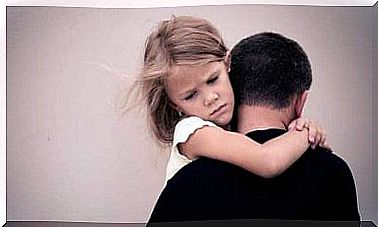Pathological Guilt And Its Complications

Feeling guilty is usually a healthy feeling. Although it creates discomfort, it is a mechanism associated with self-criticism. It is inevitable that we sometimes act incorrectly and thus harm others. In these cases, the debt warns us that we must make changes. However, there are circumstances when self-criticism crosses the line of what is reasonable and becomes a pathological guilt.
Feeling guilty means appealing to the conscience. The feeling arises when a principle has been violated or when a valuation has not been taken into account. Guilt is a feeling that is strongly related to ideology.
In psychological terms, it is virtually impossible to determine whether the behavior is “good” or “evil”. Even those who intentionally harm others may be motivated by distortions in their thoughts or feelings, caused by a changed, sick or dysfunctional environment.
But each person makes a comparison between what is right and wrong on an individual basis. When people feel that they have gone beyond their belief system or morals, they experience remorse. Where is the line between normal guilt and pathological guilt? Let’s examine this.

Normal guilt and pathological guilt
The difference between a type of guilt that can be considered normal and pathological guilt is not always clear. The first clue to deciphering this is to evaluate its frequency and intensity. Pathological guilt occurs when it is experienced often and as very intrusive.
There are psychological disorders where guilt occurs. One of the most common is depression. In this state, it is common for the person to fall into self-blame. In fact, people with depression are beginning to feel guilty about not being able to get out of the condition.
Pathological guilt is also present in obsessive-compulsive disorder, phobias and addictions. In such cases, feelings of guilt become part of the problem. It is not a healthy type of debt that helps repair or redirect a particular behavior. It acts more as a factor of constant emotional punishment, which generally aggravates the condition.
The different faces of debt
Sometimes the debt can be camouflaged. In these cases, it differs from the typical remorse you experience when you do or say something that is reprehensible. For example, there is a type of pathological guilt called traumatic guilt.

This mechanism works as follows: A person is a victim of an addiction or suffers an accident. In these cases, the emotional impact is extreme. This creates a trauma in this person’s life. Even if the person is a victim, he or she develops a sense of guilt over the situation. It is precisely one of the main effects of trauma. In this case, there is pathological guilt.
Similarly, there are cases where a person may begin to feel guilty only for having thought or fantasized about doing something bad, even if they would never do it. There should be no guilt here as no harm has been done. But if the person’s morals or ego are very limiting, he will experience his thoughts as harmful.
Overcoming pathological guilt
Pathological guilt can be very intense. One step at a time, it creates a pit and begins to influence various life decisions. It impairs self-esteem, even if it is also a product of self-deprecation. For example, someone who lacks self-love is constantly looking to be loved by others. When they fail, they feel guilty for not being able to achieve this unrealistic goal.

What you need to do in these cases is to open your mind to be able to see things from different points of view. It is important to consider norms and beliefs, especially when evaluating reasons and reasoning. Usually, these beliefs are too rigid, which does not help one to become a better person or a better member of society. Their only role will be to torment.
The help of a psychotherapist is necessary in many cases. Debt can have really deep roots that can be difficult to manage without this support. It is worth making this extra effort to break free from pathological guilt. It is a devastating force that can destroy lives.









